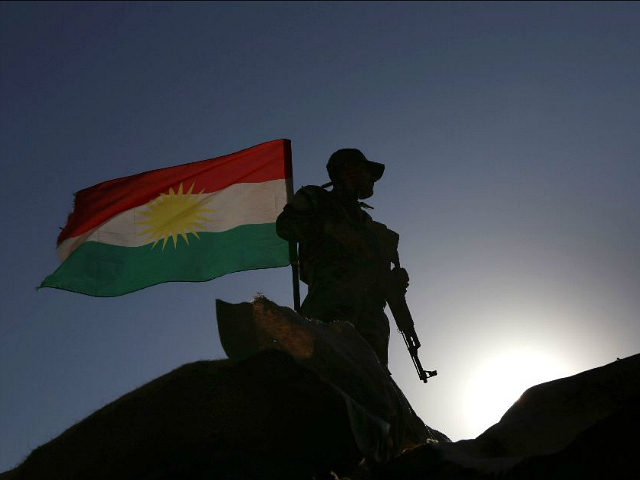The borders in Mosul that separate the Iraqi army from troops loyal to northern Iraq’s autonomous Kurdistan Regional Government (KRG) will “remain” as they were before the start of the successful U.S.-backed operation to push the Islamic State (ISIS/ISIL) out of the city, announced the Kurdish Peshmerga Ministry.
Meanwhile, Iraqi forces retook Kurdish-controlled territory around Mosul the day after the announcement, marking the latest sign of the ongoing dispute between Baghdad and the KRG over the independence referendum held by the Kurdish region despite opposition from the Iraqi government and neighboring countries.
“Kurdish Peshmerga troops withdrew without a fight from the areas, including Mosul Dam, as the Iraqi soldiers moved in, the military said in a statement on Wednesday,” reports the Financial Times (FT). “The latest move by Baghdad will fuel concerns that the advance risks escalating the crisis between two of the US’s main allies in the region — Iraq and the autonomous Kurdistan Regional Government (KRG).”
The Iraqi army, Kurdish Peshmerga troops, and Iran-allied Shiite militias in Iraq all participated in the U.S.-backed offensive to liberate Mosul, the capital of Nineveh province, which sits along the KRG’s border.
Now, the Iraqi army, backed by the Shiite militias, are clashing with the Peshmerga fighters over the Kurds overwhelmingly voting “yes” to independence on September 25.
U.S. President Trump’s administration, which came out against the independence vote, has urged Shiite-led Baghdad to ease its offensive against the KRG, citing fears about the crisis escalating and Iranian influence.
“Our message is the same to both sides — we are urging them to reduce tensions, de-escalate, co-ordinate and find areas where they can talk about things to prevent a military confrontation,” an unnamed senior U.S. official told FT.
On Tuesday, a spokesperson for the KRG’s Peshmerga Ministry confirmed that the front lines held by the two sides before the start of the U.S.-backed Mosul offensive on Oct. 17, 2016, would serve as the foundation of the border separating the Iraqi military and Kurdish forces in Mosul, reports Kurdistan 24.
An agreement between the KRG and the Iraqi government under the supervision of the US-led coalition reportedly dictates the boundaries of the Mosul borderlines, notes Rudaw.
In a statement, Halgurd Hikmat, the Peshmerga Ministry spokesperson, said:
According to an agreement signed for the Mosul liberation operation between the Kurdistan Region and the Iraqi federal government under the monitoring of the Coalition, it had been decided that the borderlines between the Peshmerga and the Iraqi army remain as they were on the day before the Mosul liberation operation started.
“Now both sides will be committed to the agreement, and in the coming days, the borderlines will be reorganized as per the agreement,” added Hikmat.
Referring to the defense lines in Mosul, KRG President Masoud Barzani suggested that they will ultimately serve to protect the Kurdish region should a “threat” arise after ISIS is defeated.
“We don’t know what will come to us after ISIS. We cannot say ISIS is gone and let’s relax now. This kind of challenge and threat will always be there. Therefore we should do for the Peshmerga several times more than what we ever did in the past – better organize ourselves, upgrade our weapons, improve our training and be ready for any threat,” he said.
Backed by Iran-allied Shiite paramilitary groups under the umbrella organization known as the of the Popular Mobilization Forces/Units (PMF/PMU) or al-Hashd al-Shaabi, the Iraqi military has forced the KRG out of various disputed areas including Kirkuk, Shingal, Gwer, Makhmour, Khanaqin, and Snune, points out Rudaw.
On Monday, the Iranian military and the Baghdad-sanctioned PMU troops took control of Kirkuk from the Peshmerga.
Although the Pentagon has praised the PMU’s contributions to the U.S.-led fight against ISIS, now the Trump administration is expressing concern about the role the Shiite militias are playing in the ongoing confrontations between Baghdad and Erbil.
“We do have concerns about having PMF in those [disputed] areas [claimed by Baghdad and Erbil] and would like those to be pulled for more regular Iraqi forces to take over,” the anonymous U.S. official told the Financial Times. “We recognize the federal government’s prerogative in re-establishing a presence in the areas they’ve taken back. But we also need to know there is a limit that he [Iraqi prime minister Haider al-Abadi] has placed on these movements.”
Neighboring countries, including Iran, Turkey, and Syria, oppose the KRG’s independence efforts, citing concerns that it may fuel separatism among the Kurds within their borders.
Baghdad, Iran, and Turkey have threatened military retaliation if the KRG does not cancel the outcome of the vote, a demand that has fallen on deaf ears.

COMMENTS
Please let us know if you're having issues with commenting.